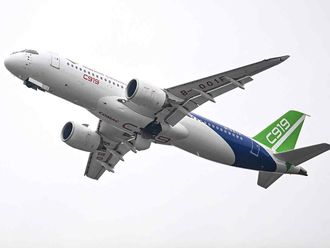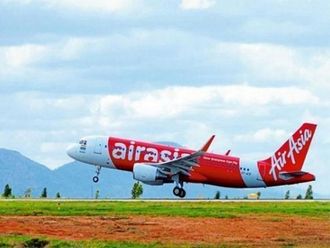Dubai: Emirates, Etihad and Qatar Airways will not have the pilots necessary to fly the airplanes ordered this week in multi-billion dollar deals unless there are changes in pilot training, aviation industry experts have warned.
High education fees impacted by rising fuel costs have deterred students from pilot training, reducing the amount of pilots coming through aviation schools.
“The lack of good, high quality individuals coming through is going to be a challenge,” Edward Davidson, vice-president, flight operations at Canadian carrier Porter Airlines, said at the Dubai Airshow on Sunday.
Davidson was addressing a conference at the Dubai Airshow on ‘Training the Gulf’s New Generation of Aviators’.
Speaking to Gulf News on the sidelines of the conference, Davidson said the record orders announced by regional airlines Etihad Airways, Emirates and Qatar Airways posed the biggest hurdle for future pilot demands in the Arabian Gulf.
“If you look at the number of aircraft on order between the big three airlines in the Middle East — Emirates, Qatar and Etihad — there is going to be a significant challenge there in getting that number of pilots in this Gulf region,” Davidson said.
Alternative
Unless a solution is found in the immediate future, the alternative will see airlines recruit pilots from other regions and, in turn, create a shortage in that market.
“Stealing from each other is essentially what’s going to happen,” Davidson said.
Addressing the conference, Chet Fuller, senior vice-president, Commercial Bombardier Aircraft, said Sunday’s orders by the three Gulf giant airlines represented a need for 6,000 pilots.
“As compared to the needs and the demand in the region for pilots, the Middle East is minus 65 per cent,” Fuller said.
He said that the quantity of trained pilots would continue to be impacted by indirect factors, including declining populations (excluding immigration) in Europe and North America.
But it is not just the demand for pilots by the big commercial airlines that is putting a strain on the future needs of the aviation industry.
Demand by business jets
The business jet segment of the global aviation industry is now in reach of new markets in India and China as these countries produce an increasing number of billionaires.
The rise of business jets adversely affects the number of pilots available because they compete for the same pilots as the commercial airlines, Fuller said.
Esmail Mohammad Al Baloushi, assistant director, Safety Affairs Sector, General Civil Aviation Authority (GCAA), said at the conference that the aviation industry needs to evolve to the meet the future demands.
“We should start with the challenges today, not just the airlines. We, as regulators, are facing this challenge…. One cannot cope with [the challenges using] the legacy ways of doing business,” he said.











